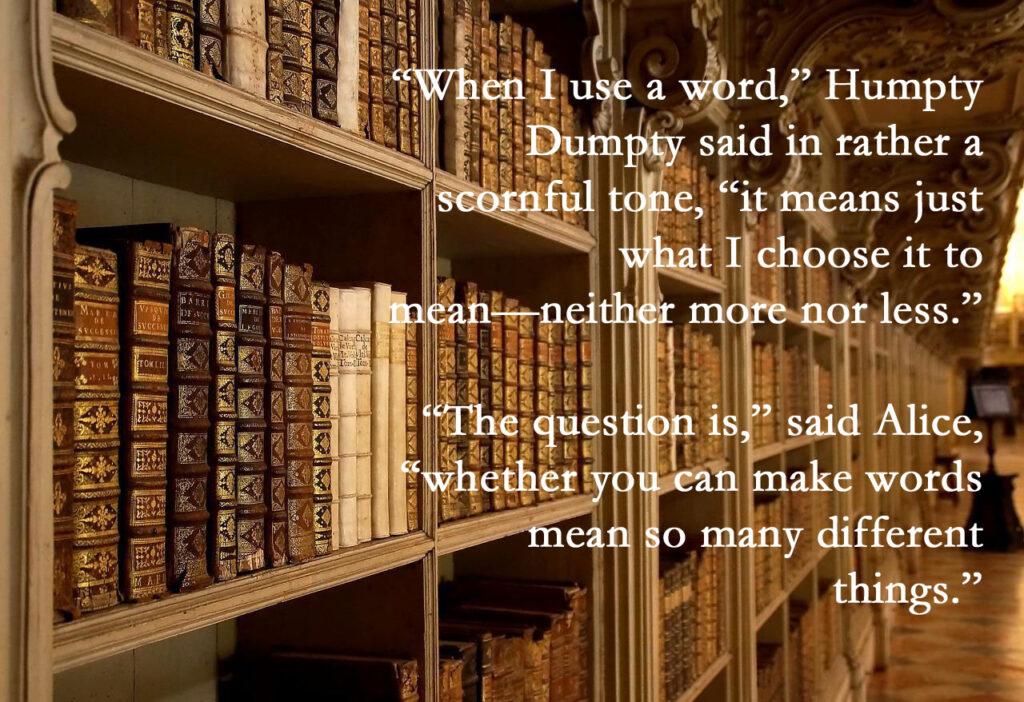Last week we explored a sense of what “Originalist” means in the field of Constitutional law studies. This week, I thought I would bring some sense of that discussion to a similar argument, biblical literalism. The concept of biblical literalism is tied up in a culmination of similar, but inherently different concepts. Keeping in mind that these concepts are developments of the 19th and 20th centuries as Protestantism gained authority, let’s look at the nuances of these approaches. Watch your step, this is going to get more tangled than a game of twister.
Inerrant simply means that the person or thing is incapable of being wrong. Biblical inerrancy is the belief that the Bible is contains no errors or faults, or that at the very least scripture in the original manuscripts does not affirm anything that is contrary to fact. Keep in mind, we do not have access anything close to the original manuscripts.
To be infallible means to be incapable of making mistakes or of being wrong. Here, the impetus shifts just a bit. Some will see these terms as interchangeable however note that inerrant refers to a set body of knowledge whereas infallible refers to an action—a capability.
The definition of biblical literalism as expressed in the Chicago Statement on Biblical Inerrancy (1978) goes something like this:
WE AFFIRM the necessity of interpreting the Bible according to its literal, or normal, sense. The literal sense is the grammatical-historical sense, that is, the meaning which the writer expressed. Interpretation according to the literal sense will take account of all figures of speech and literary forms found in the text.
WE DENY the legitimacy of any approach to Scripture that attributes to it meaning which the literal sense does not support.
Keep in mind that literalism refers to a belief that scripture is a literal record unless it is clear that the author intended allegory, poetry, or some other form of communication. That part can get quite messy since there are as many opinions on what portions of scripture fall under which classification and there are readers. Those arguments most likely started before the ink was dry on the first manuscript. Which, quite possibly, was one of the drivers for the many versions of original texts that have been found. The desire to make things just a bit clearer would have teased out the many thoughts and interpretations developed during early church history.
The beauty of records from that time, at least as it relates to New Testament writings, is that the interpretation of what was meant by the sayings of Jesus, or Paul, or James, or any other early leader was not just the purview of an elite class of priests and legalists. Doctrine was debated in the street, at the pub, in the market, and in small home gatherings across the Middle East and later into Europe. If you are a serious scholar of the faith, a study of these early years can be quite enlightening.
Given this information, what then, would be the scriptural equivalent of an “Originalist?”
When it comes to the concept of inerrancy, one must assume that the bits and pieces that have come down to us are the complete story (we keep finding more), the unaltered story (we keep finding more), and accurately portrayed within the source cultural framework through hundreds of translations and paraphrased exercises. Yes, I know. When you go to Sunday School you are grilled with the information that God has protected the word throughout the millennium and preserved its original meaning unscathed. (I was raised Pentecostal). Except that makes no theological sense. Why would the message be the same for a shepherd on the desert slopes of the middle east as it would be for the modern urbanite? (We’ll get to how that might happen).
How can we honestly take the literal law as recorded in Leviticus (which was a priestly law) and Deuteronomy and say that it must be applied precisely as written (most frequently in a King James Version). I know this is an old argument, but do you really think it is appropriate to stone an adulteress? Of course, churches today would just shame her into nonexistence and blame her without ever checking out whether the guy was a predator or just managed to love her as a person.
Then there is the question of infallibility, which we noted above is an attribute of a person, not a document. For a faith that spends oceans of ink on the fallibility of us poor humans, we are certainly obsessed with infallibility. Why must we be infallible? Conversely, why must we be so broken that we are unworthy the moment we take breath?
Using the elements to see what is meant by biblical literalism, we arrive at a few conclusions. What the Bible says is clear in all ways and we can depend on its instruction in all things. Including stoning. Or, the Bible has no errors although on the face of things it does, indeed, contain contradictions (otherwise the game of my verse beats your verse would not hold interest for long). Oh, and some of the math doesn’t work out, I’ve checked. Or we could try to moderate some of these issues by claiming clemency for some things (called grace from the pulpit) but not for the issue or person we are passionate about—which is usually, but not always, not our particular “sin.”
Here, then, is the problem with creating an iron cage for both the Hebrew and the Greek text of the scripture used by Christians worldwide. We steal its breath, we crush its inspiration, we annihilate its ability to bring us comfort and growth today in this place and in this time.
I have grown to love many of the passages of scripture, but that love came from a deep need to see the author of any one passage as a seeker for truth in their moment. Something like what we experience when we hear a parable, or a fable. A vehicle, if you will, to find that kernel of truth about what the author was struggling with.
Here, let’s look at an example. There is a familiar story of a Samaritan woman who went to the well to get water when there would be few folks about, and she bumps into an itinerant rabbi named Jesus. (John 4:4-26) In Western tradition, this poor woman is accused of bed hopping and therefore down on, what, three counts. She’s a woman, she’s a Samaritan, and she sleeps around. (I love how this particular rabbi went out of his way to talk to people who were “not up to code). That’s the western interpretation.
However, if you are from the cultural setting of the middle east, you know that women of the time (and in some countries now) had little choice in the matter when it came to marriage. If she was married five times, it was because the man that took her decided she wasn’t worth keeping. Maybe she couldn’t produce a son, maybe she limped, who knows, but suffice it to say, she had little control over whose bed she occupied and at the time of the incident, the man she was with hadn’t even bothered with the thin veil of marriage.
Now, let’s look at the vastly different interpretations of the meaning of this passage that comes from these two perspectives. Is the Samaritan a whore in need of salvation and instruction on the correct conduct of a lady, or is she a broken and battered soul in need of a helping hand, a sense of freedom, of personhood, and dignity?
Yeah, sorry. When a woman reads scripture, patriarchy is the example of what not to do, not the God given order of the universe.
Here, then, is the point. I have no argument that scripture with all its beauty and its gore can be a source of life-changing inspiration. My issue is that too many folks wave it around in the air as a shield for their own life choices. They preach at us all with a firm belief that they and only they have the correct interpretation of words written thousands of years ago in moments of pain, pride, joy, and deep, aching soul searching.
Given a moment, or three, I can fire back a passage that refutes or at least questions most if not all positions I see floated about in today’s scripture wars. But I don’t think that is the purpose of scripture. Give me a Midrash where the deeper things of life are discussed and debated over decades, forever revealing yet one more facet of the gem of the human struggle to understand the universe and leave the dogma and the iron coated straightjackets behind.




No Comments